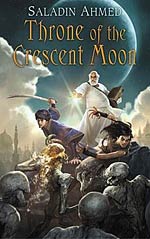
![]() nightxade
nightxade
6/26/2014
![]()
It's refreshing to read a fantasy story that isn't set in good old medieval Europe, where everyone is blond and blue eyed and any exotic cast members have to be repeatedly singled out for their exoticness. Throne of the Crescent Moon takes place in a Middle Eastern setting, but Ahmed instantly makes it feel like home by walking us into a tea house with Dr. Adoulla Makhslood, who initially appears to be the main protagonist. Adoulla is, by no means, a typical hero. He is an older, larger man contemplating retirement from the brutal and deadly career of ghul hunting, but is dragged back into it with a ghastly mass death at the hands of a surprisingly large number of ghuls. Who is powerful enough to create and control so many of the hideous creatures, and how are they able to seemingly sever the souls of their victims?
The hunt leads Adoulla and his apprentice—a tight-laced young man of God with a sharp blade but little street smarts—into the desert. There they face down the ghul pack with the help of a fierce young tribeswoman who has lost her clan to the same killers.
What I enjoyed most about this tale wasn't the action (though it was very good when it occurred), or even the over all plot (which dragged in the middle and then came together too abruptly at the end). I loved the characters—specifically the juxtaposition of the different personalities, beliefs and relationships as Ahmed brings the group together to resolve the situation. I was surprised when the point of view switched over first to Raseed, Adoulla's young assistant, and then to Zamia, the tribeswoman. Then I was pleasantly surprised when it also included chapters from the perspective of Adoulla's friends, an older couple comprised of a mage and an alchemist who are very much in love, and like Adoulla, want to get away from the dangers around them. Ahmed lets us see both the story and the other characters through their eyes. The devout Raseed, who's actions are tempered by doubt and shame when he fails his beliefs. Litaz, the middle-aged healer who exudes confidence, but longs to return to the simplicity of her home. Dawoud, her husband, who adores her dearly, but fears what the cost of his magical abilities will ultimately do to their relationship. Adoulla, the jaded hunter who envies the relationship his friends have. And Zamia, the Angel-touched warrior "savage," who cannot abide the heathens whom she has been forced to work with to avenge her lost tribe.
Each brings their unique insight into the story and it is interesting to see them each grow and change—Although, surprisingly, it is the older protagonists that do the most growing and changing. Raseed struggles with his rigid beliefs and his sudden fondness for Zamia, but there is little pay off for the reader in this, and Zamia herself becomes a very flat character after such a promising beginning.
Political intrigue rears its ugly head within the plot, as the city of Dhamsawaat deals with a greedy and out of touch Khalif, versus the Falcon Prince—a Robin Hood-type character with questionable motivations. Meanwhile, looming ominously over everything is a deadly mage and his minions.
Religion also plays somewhat of a role, though Ahmed is by no means preaching. Religious beliefs define the characters in many ways. For some, like Raseed, it is a limitation, as he struggles to consolidate his beliefs with his duties and with his natural feelings toward Zamia. Though Adoulla's disrespectful admonishment of Raseed's devotion sometimes became tedious, this was another element of the relationship between the characters that I enjoyed seeing play out.
Though I wasn't impressed with how everything wrapped up in the end, or in the lack of depth that went into the magic used, I enjoyed Ahmed's crisp and descriptive writing style and absolutely loved some of his very memorable and unique characters.